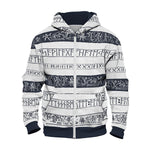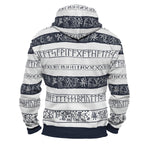Runeword Zip Hoodie







$64.00
$64.00

Worldwide Shipping
● Production time 4-7 business days
● Estimated delivery 2-3 weeks

Product Information
20% Cotton, 75% Polyester, 5% Spandex (waist/cuffs)
Brushed microfleece inside
Mediumweight - best for cooler summer evenings or on other seasons
The story & symbolism
This striped design features references to archaeological finds on it's stripes, namely the Lindholm amulet, Golden horns of Gallehus and the Kraegehul spearshaft - you can learn more about each of them below. They are combined as all of these symbolize a ritualistic tone to invocate gods and likely grant it's wearer abilities to better connect with the spirits considering the objects they were found on.

Gallehus horns
The horns are dated to the early 5th century. The first was rediscovered in 1639 and the second one almost a 100 years later in 1734. They feature a Proto-Norse Elder Futhark inscription at the top that reads 'ᛖᚲᚺᛚᛖᚹᚨᚷᚨᛊᛏᛁᛉ᛬ᚺᛟᛚᛏᛁᛃᚨᛉ᛬ᚺᛟᚱᚾᚨ᛬ᛏᚨᚹᛁᛞᛟ᛬'. On them are also pictures and motifs which seem to depict a ceremony with creatures and animals. Several of these humanoid creatures feature what appear to be horns - possibly a headdress as well as a figure with three heads, perhaps a forgotten god, certainly a myth that might have been lost. On one of the horns can be seen a number of human figures which have been speculated to be a ciphered sentence or chant where each person resembles a letter.The original horns sadly do not exist anymore due to a goldsmith stealing them and melting them down in 1802. There were casts made of the original horns but they too suffered a poor faith, ending up in a ship wreck and have never been found. The reconstruction of these horns were made entirely on pictures of the original horns - these were also stolen in 1993 but luckily found nearby the museum they were stolen from. Then again in 2007 another replica of these horns made from silver were stolen but recovered shortly after. So my best advice is to keep an eye on this piece of apparel because people seem to want to steal it.

Kragehul spearshaft
Dated to a similar period during the 4th to 6th century it was rediscovered in 1877 from a bog. Bogs were among popular places to make sacrifices to, this is largely due to the bogs preserving what's offered to them - sacrifices to the sea could have been popular as well but we would not know about it since we have no evidence. The spearshaft features the Elder Futhark on it and reads 'ᛖᚲ ᛖᚱᛁᛚᚨᛉ ᚨᛊᚢᚷᛁᛊᚨᛚᚨᛊ ᛗᚢᚺᚨ ᚺᚨᛁᛏᛖ ᚷᚨᚷᚨᚷᚨ' with the latter part of ᚷ and ᚨ being written as one, a bindrune.It features the popular 'Ek Erilaz' which means 'I the erilaz' and a chant at the end. Erilaz could've been an early name for Earl or Jarl, it's also associated with ale similar to how ALU is written on a lot of runic inscriptions and means a sort of ale likely. The spearshaft is one of the many exmaples which suggest runes were not used just for writing, but for chants/magic/invocations and so on. Considering it's written on a spear shaft it could have been a sacrifice to Odin as the Allfather is known as the spear god and the ending 'gagaga' part could be a chant towards him. If the word Erilaz means infact someone from nobility it also would make sense this is a sacrifice to Odin as he was the god of nobility and poets.

Lindholm amulet
This one is dated to around the 2nd to 6th century again found from a bog. It was rediscovered in 1840 and split in half, which resulted in the loss of one rune on the inscription but the artifact is otherwise intact. It also features the word Erilaz on it as well as what appears to be a chant or sequence of runes reading 'ᛖᚲᛖᚱᛁᛚᚨᛉᛋᚨ[ᚹ]ᛁᛚᚨᚷᚨᛉᚺᚨᛏᛖᚲᚨ ᛬ ᚨᚨᚨᚨᚨᚨᚨᚨᛉᛉᛉᚾᚾ[ᚾ]ᛒᛗᚢᛏᛏᛏ᛬ᚨᛚᚢ᛬' as you can see the sequence end in 'ALU'. The ansuz runes have been interpreted as a reference to Odin or perhaps several gods from the pantheon.The bone has been reshaped to appear as a rib bone, this is likely not done randomly. It's possible this is a story we have lost or not yet rediscovered where a god or legend was associated with a rib, perhaps there are other amulets like this which would complete a set but as of right now we don't know. I've compiled these three designs into a whole as they reference stories we have lost and I feel all of these are ancient teaching meant to be passed on and hopefully one day we will once again know more about them.
From social media
Runeword Zip Hoodie
$64.00
$64.00

Worldwide Shipping
● Production time 4-7 business days
● Estimated delivery 2-3 weeks










 Upperbody
Upperbody
 Lowebody
Lowebody

 Facebook
Facebook